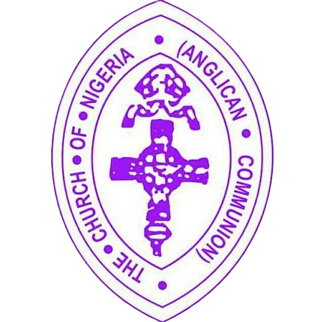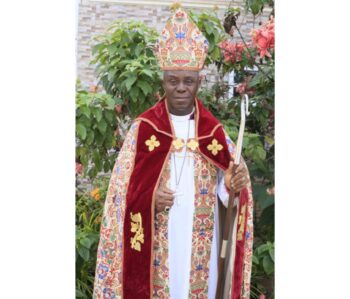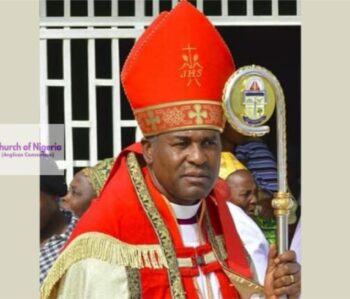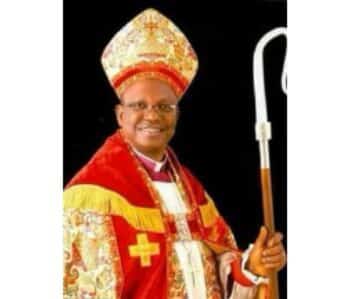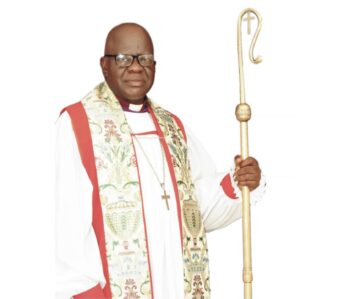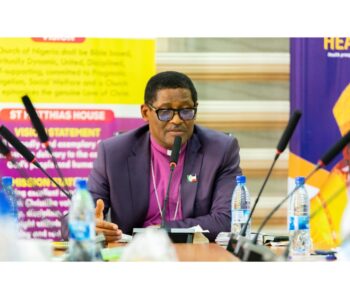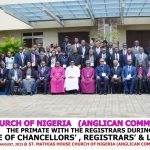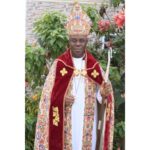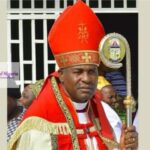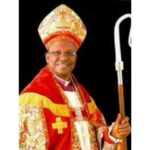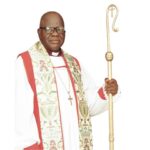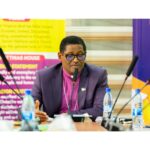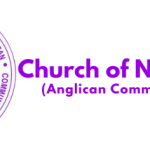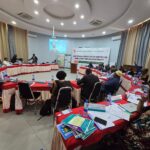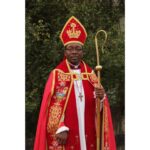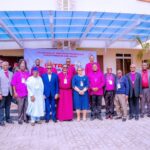- Korede Akintunde
- June 26, 2023
- 0 Comments
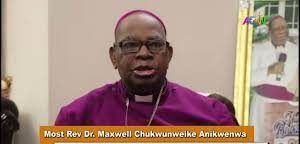
EARLY LIFE:
Maxwell Samuel Chukwunweike Anikwenwa was born 22nd day of November 1940, into the family of Mr. Ezekwesili Anikwenwa of Ozzu Village, and Mrs. Ifeoma Anikwenwa of Umori village, all in Awkuzu, Oyi Local Government Area of Anambra State, Nigeria.
In the early life of Maxwell, his father, who was a herdsman on an Agricultural farm at Nkwelle-Ezunanka; and his mother, a petty trader, both played remarkable roles in molding him on the right path at a tender age. However, life was not that rosy and cozy for the young Maxwell at the earliest stage, he lost his mother at the age of four.
MARRIAGE AND FAMILY:
Maxwell wedded his heartthrob Blessing Chidiogo Anikwenwa (Nee Ananti) of Oba, Idemili South Local Government Area of Anambra State. The holy solemnization was held at St Barnabas Church, Ojoto, Anambra on 7th April 1969. His wife is a product of the Anglican Girls’ Primary School Kaduna, Archdeacon Crowther Memorial Girls’ Secondary School, Elelenwa. Milton Margal Teachers’ College, Freetown, Sierra Leone; and the University of Hull, United Kingdom. She is an outstanding teacher by profession, she holds NCE from Sierra Leone, as well as BA (Philosophy) and MA (Philosophy) from Hull University UK Throughout his career, his dear wife, Blessing, remained a formidable asset and support base for his ministry.
They are blessed with three children, Uchechukwu, Ebelechukwu, and Ogochukwu. Uche is a Venerable of the Anglican Church, serving in the Diocese of Kubwa, FCT. He is happily married to Mrs. Ijeoma Blessing Anikwenwa with two children. Barrister Mrs. Ebelechukwu Dan-Okeke (Nee Anikwenwa), is the first daughter. She is the Lay Synod Secretary of the Diocese of Abuja and the former Secretary, of the Parish Church Council, St. James Church, Asokoro, Abuja. She is married to Mr. Dan Okeke with five Children. Mrs. Ogochukwu Obiakor (Nee Anikwenwa), lives in Canada with her husband, Mr Chijioke Obiakor, they are blessed with two children.
His family was indeed a great source of inspiration and support to him, and significantly contributed in great measure, to his success and excellence in his service as a servant in the vineyard of God.
EDUCATION/ORDINATION:
the young Maxwell completed his primary school respectively with the support of his father who saw him through his basic studies between 1947 till he obtained his First School Leaving Certificate in 1954. He became a proud product of the Emmanuel School, Nkwelle-Ezunaka, and St. James School, Awkuzu, in 1954.
It was a huge privilege to be a primary school graduate at that time, Maxwell remained a Teacher’s Boy, even after he gained admission into the prestigious Dennis Memorial Grammar School (D.M.G.S.), Onitsha, at the age of fourteen.
He manifested a consummate development in both the cognitive domain, affective domain, and psychomotor domain, which did not only stand him out in the school but also endeared him to Bishop C.J. Patterson and the then D.G.M.S principal, Mr. S.J.C. Cookey. He and his close friends, Benjamin Ofoma and Ephraim Idem were then regarded as the Patterson’s Boys which led to his promotion as a Chapel Perfect in the School.
Maxwell obtained his School Certificate from the D.M.G.S., he passed his examination for admission into the School of Agriculture, Umudike, and another into St. Mark’s Teachers’ Training College, Nibo/Nise. Hence, he was confronted with two contending choices but he was inspired by his father to be an Agric Assistant and that was the reason behind his application to the School of Agriculture, Umudike.
It was said that “The hand of God swayed him from his love for Agric Assistant to God’s preparation for a robust and exemplary ministry, thereby influencing his choice between the two admissions that were offered to him by the two different schools”. He ended up choosing St. Mark’s Teachers’ Training College, Nibo-Nise, in 1960. he graduated in 1961 after obtaining the Grade Two Teachers’ Certificate and qualifying as a pivotal teacher becoming a teacher was a product of an encounter and a partial fulfillment of a prophecy upon his which led to his encounter with the then Archbishop of Canterbury. Most Rev. Geoffrey Francis Fisher, who accosted and engaged him in a discussion during the C.M.S. Centenary celebration in 1957 at the All-Saints’ Cathedral, Onitsha,
This happened at the time Maxwell was rounding up his studies at the D.M.G.S. Onitsha Archbishop Fisher was visiting Onitsha then because the then Archbishop of West Africa, Archbishop Cecil John Patterson, was living in Onitsha. And Maxwell, alongside one of his co-students at the D.G.M.S. went to serve.
Its consummate fulfillment when he moved from being just a classroom teacher to becoming a teacher in the house of the Lord, as was seen in what followed later in his life. There, at the Oraukwu Grammar School, he taught from 1962 to 1963.
After two years of classroom teaching, he resigned to fully pursue his ministerial calling. In 1964, he was already at Trinity College, Umuahia, taking his training for the sacred ministry. At Trinity College, he retained his quintessence as a celebrated scholar and sportsman full of energy and the Holy Spirit.
He remained shiny and exemplary in his academic performance, sports, and spiritual life, without allowing any cause decay to another, despite his involvement in social politics and leadership, up to the point of becoming the President of the Students’ Union Government (SUG) at Trinity College.
In 1963, he was awarded a Diploma in Theology and was ordained as a deacon on the 18th of December the same year by Archbishop Cecil John Patterson, who also posted him to serve at the All-Saints’ Cathedral, Onitsha. Shortly after that, he was priested at the same Cathedral in 1967. Due to his devotion, he served as Chaplain of the Cathedral, and later, Chaplain of the Archbishop of West Africa, between 1966 to 1969.
It’s also worth noting that during the Nigeria/Biafra War, the young priest, Maxwell served in the Military Chaplaincy, thereby rising to the rank of Captain.
ACHIEVEMENTS OUTSIDE NIGERIA:
Maxwell left the shores of Nigeria IN 1969, to further his studies. He first landed in Sierra Leone where he settled for his degree program at the Fourah-Bay College, Sierra Leone. His abroad studies there were bankrolled through the sponsorship of the World Council of Churches, which was secured for him by the Diocese on the Niger.
He became an Assistant Priest in 1969 at the All Saints Church, Kissy Road, Philip’s Patten Street, Freetown, in Sierra Leone alongside, pursuing his studies. He got a Bachelor’s Degree in Religion and Philosophy three years after, in 1972. Also, he won the Solomon Caulker Prize as the Best Student in Philosophy in that institution in 1970. He was also among the few students selected to attend the World Students Christian Federation, in Lusaka, Zambia, in 1971.
He enrolled for his post-graduate studies starting with a Post Graduate Diploma in Ecumenism (PGD Ecumenism), which he pursued at the Graduate School of Ecumenical Studies in Geneva, Switzerland. During his studies there in the school, he also won an award as the Best Course Student in 1973. And, upon completion of his program there in Switzerland, he proceeded to the Ripon Hall of Oxford University, England, where he earned a Master of Theology (M.Th.) in 1974. While there, he was also among the few selected to attend the All-African Conferences of Churches, Lusaka Zambia in 1974. He completed a Master’s Degree in Ecumenism, in 1975 at Oxford University.
BACK HOME:
Maxwell, in 1975, came back to his fatherland, Nigeria. He resumed his priestly work at the Niger Diocesan Lay Training Centre, Nnewi, and later at St. Andrew’s Church, Onitsha. While, the then newly-elected Bishop on the Niger, The Rt. Rev. Jonathan Arinzechukwu Onyemelukwe appointed him the Synod Secretary of the Diocese, a post he held till February 1987.
In 1976, he was elevated to the reverential position of a Canon by Bishop Onyemelukwe. There, he served as Vicar from 1976 to February 1987 as well as an Urban Missioner from 1978 to February 1987.
BISHOP ORDINATION:
On March 8, 1987, He was consecrated to a new echelon as the bishop of the (then) newly-created Anglican Diocese of Awka, by His Grace, The Most Reverend T.O. Olufosoye. The consecration service was held at the All Saints’ Cathedral, Onitsha; while on March 9, 1987, he was enthroned at the St. Faith’s Pro-Cathedral, Awka. This enthronement relocated Maxwell from St. Andrews Church, Onitsha where he had been since 1975, to Awka.
A year after his consecration as a Bishop, Maxwell became the Secretary of the College of Bishops’ Meeting, Eastern Zone of Nigeria, in 1988. In his ecclesiastical vision and efforts to make the Diocese of Awka stand out, he rolled out ad implemented a chain of transformational initiatives in the Diocese, the evidence of which cynosure abounds in the Diocese, to date.
THE ARCHBISHOPRIC:
Maxwell’s horizon of ecclesiastical responsibility was expanded in 2000, when he was elected and presented as the Archbishop of Province Two, with twenty-three dioceses under his occupying the position between 1998 and 2000. He held this revered position till 2002, when he became the first Archbishop of the Province of the Niger, following the division of the Province Two into three Provinces, one of which is the Province of the Niger in 2002. That same year, 2002, he emerged as the Dean, of the Church of Nigeria (Anglican Communion). And shortly after that, in that same year, he was also elected the Chairman of the Christian Association of Nigeria (CAN), Anambra State Chapter.
In 2007, he was re-elected the Archbishop of the Province of the Niger. While he occupied the position of CAN Chairman in Anambra till 2008, he occupied the position of the Dean of the Church of Nigeria till 2010, making him the longest-served Dean in the history of the Church of Nigeria.
Maxwell also served as the Chairman of the Joint Provincial Council, East of Niger. It was during this period that he ensured the full licensing and certification of Paul University. Awka, by the Federal Government of Nigeria, with the support and assistance of his brother bishops, East of the Niger. he also recovered the Trinity College, Umuahia to the Anglican Communion, East of Niger, following the abandonment of responsibilities by other partners. He also consolidated the reforms that made the Superannuation Fund thrive and become a solace to retired and ailing priests, while also serving as a vehicle for investment for the church.
Indeed, during his tenure as Bishop and Archbishop, Maxwell’s transformational initiatives resulted in milestone achievements for the Diocese and the Province at large, both in areas of education, youth empowerment, capacity building, ecumenical relationships, moral growth, and spirituality, among others.
RETIREMENT:
Having given his best in active and faithful service to God and humanity for over four and half decades, Maxwell, on 22nd November 2010, honorably stepped down as the Bishop of the Diocese of Awka and Archbishop, Ecclesiastical Province of the Niger, having attained the age of 70. He was the third Archbishop of Province Two (succeeding Archbishop J. A. Onyemelukwe). He was also the first Bishop of the Diocese of Awka and the first Archbishop of the Niger Province. The Most Rev. Dr. Ephraim A. Ademowo succeeded him as the Dean of, the Church of Nigeria.
In one of his interviews shortly after stepping down as Archbishop, the Emeritus Archbishop Maxwell said he was a priest forever and would never retire from or be tired of doing God’s work. He said: “I’m not retired. Certainly not. I’m in my regalia, so I’m an archbishop, putting on my regalia.”
“I’m not retired I withdrew, I stopped down. You can see the difference. There is nothing an Archbishop can do that I cannot do. I can baptize, during the ordination of priests, I lay my hands, during the dedication, I lay my hands I stepped aside, I am not de-robed.”
Even in his old age, he never relented in his services to God or stopped attending religious functions. he was always present and punctual at many church and religious activities whenever invited. He was also lending his voice and highly valued opinion on both local, national, and international issues and affairs. his presence in church activities and the words of wisdom that always oozed out from his mouth were always a source of inspiration to many, both the young and the old.
DEATH:
Maxwell, on the 13th day of March 2023, answered the last call of his Maker, whom it pleased to call him home to the great beyond, after 82+ years as a mortal. Not only did his death throw the entire Church into mourning, but it also created a huge vacuum in the hearts of many who encountered him, whether facially or virtually. Until his death, he was known as an icon of hope, integrity, fairness, transparency, and honesty. He was a consummate missionary statesman, a distinguished, self-effacing servant leader, a quintessential educationist, and a master builder of persons and institutions.
He is survived by his wife, Mrs. Blessing Chidiogo Anikwenwa (Nnediogo), and three children- Venerable Uchechukwu Anikwenwa, Barrister Mrs. Ebelechukwu Dan-Okeke, and Mrs. Ogochukwu Obiakor, as well as many relatives and in-laws. May his faithful and honest soul find eternal rest in the bosom of the Almighty, Amen.
INTERNATIONAL CONFERENCES ATTENDED:
- World Students Christian Federation, Lusaka, Zambia (1971)
- All African Conferences of Churches, Lusaka, Zambia (1974).
- Conferences of Urban Missioners West Africa, Darkar, Senegal (1977)
- . Mission Issues Strategy and Advisor Group of Anglican Consulate Council, London (1987)
- Anglican Consulate Council, Nairobi, Kenya (1989)
- Anglican Consulate Council, Florida, USA (1990)
- Anglican Consulate Council, Kota Kinabalu, South Africa (1992)
- Conference of Anglican Provinces in Africa, Kenya (1988)
- Conference of Anglican Provinces in Africa, Zimbabwe (1991)
- Lambeth Conference, England (1988)
- Anglican Consultative Council, South Africa (1993)
- South-south Encounter (Anglican Province in the Third World), Limuru, Kenya (1993)
- Lambeth Conference, England (1998)
- All Anglican African Conference of Bishops, AAACB Lagos, Nigeria (2005)
- GAFCON (2009)
PRIZES, HONOURS, AND AWARDS RECEIVED:
- Solomon Caulker Memorial Prize in Philosophy, University of Sierra Leone (1971)
- Best Course Student, Graduate School of Ecumenical Studies, Geneva, Switzerland (1973)
- Officer of the Federal Republic (OFR) by the late President Umaru Musa Yar’Adua (2008)
- Order of Saint Mellitus (OSM) by Bishop Richard John Charles of London (2010)
- D.D (Honourary Causas) of Paul University, Awka
- Maxwell Anikwenwa Annual Public Lecture by Paul University
- Archbishop Maxwell Anikwenwa Sec School, Awkuzu
- Life member of the Board of Trustees of the Bible Society of Nigeria, representing South East Zone.
ACHIEVEMENTS:
- As the Synod Secretary: and with the approval of the Diocesan, he helped to secure yet another parcel of land for the Anglican Mission at Awada, Onitsha, where the present St. the James’ Anglican Church now stands.
- He facilitated the establishment of a Health Centre at Aguieri-Otu in Anambra East Local Government Area, with the Onitsha Archdeaconry and the Diocese on the Niger; Faith Hospital Awka for the health welfare of God’s people. 29 He built Diocesan Hospital at Awba Ofemili for the Rural Population in Awka North axis.
- As a Bishop: he initiated a major administrative re-organization by creating new Archdeaconries in the Diocese of Awka from the previous two (Awka and Aguata Archdeaconries) When he was enthroned as the Bishop of the Diocese of Awka on the 9th March 1987, the Diocese had just two Archdeaconries – Awka Archdeaconry (which had 15 Districts), and Aguata Archdeaconry (which had 20 Districts). By the time the Diocese of Aguata.
- With the support of his wife and the Diocesan Women, he brought about economic empowerment for the Diocese through the construction and commissioning of the Emmaus House Complex to be an entrepreneurial venture to raise funds for the Diocese’s missionary enterprise.
- He established a Christian literature and publications unit to inform, instruct, educate, and entertain, thereby ensuring the mental, moral, and spiritual health and growth of the Diocese. The publications include; The Awka Diocesan Newsletter-Together, A Daily Bible Reading Guide-Daily Life under God; and The Christian Family magazine of the Mothers’ Union and Women’s Guild. The circulation of these publications has extended to other Dioceses. The Daily Life under God has been accepted by the Dioceses East of the Niger as an alternative Bible Reading Guide. This wonderful Anglican Devotional Guide was later taken over and renamed Daily Fountain by the Church of Nigeria.
- He introduced the “Office System” which meant that a clergyman must have a functional office instead of his residence as his administrative base for effective and coordinated operation;
- He introduced the “Banking System” whereby the church pays all its money into the bank instead of leaving the money in the custody of individuals;
- He helped to acquire a parcel of land at Woliwo where St. Monica’s Church now stands. He facilitated the construction of the church hall that served as a take-off point for the church.
- He accomplished the return of the “sacred shrine” of the Anglican Mission, East of the Niger, called St. Paul’s College, Awka to the Anglican Church. St. Paul’s College was for many years occupied by the government of Anambra State College of Education.
- He facilitated the establishment of St. Paul’s University College in 1992, which later became Paul University, Awka, which is the only University jointly owned by the Anglican Communion, East of the Niger; Accomplished the licensing of Paul University, Awka by the Nigerian University Commission (NUC).
- He established educational institutions for manpower development and evangelism in the Diocese, which include the Mary Summer Vocational Institute, Awka, St. Mary the Virgin Convent, Ufuma, St. Catherine’s Commercial School, Nanka; St Paul’s Secondary School, Nibo-Nise, among many others.
- Upon inheriting Bishop Crowther Junior Seminary, Awka (now Bishop Crowther Seminary, Awka) in 1987, he transformed it into a national standard School.
- He conceived and adopted a symbol of identity for Awka Diocesan Organisations in the form of uniforms for the members of the Women’s Guild, Mothers’ Union, Girls Guild, and Fathers’ Fellowship, among others.
- He accomplished the recovery of the massive land of the Village of Faith (housing the Emmaus House, Our Saviour’s Parish, and the current Archbishop’s Lodge, Awka) to the Diocese of Awka.
